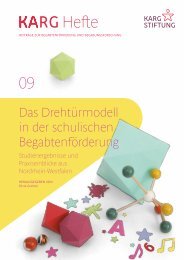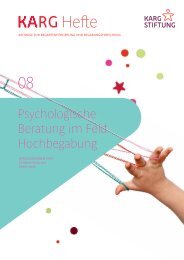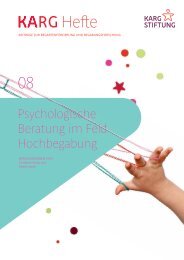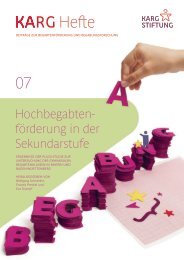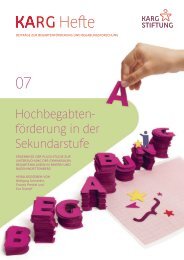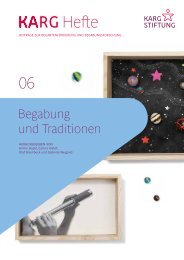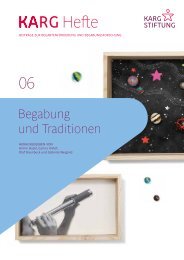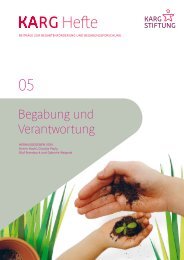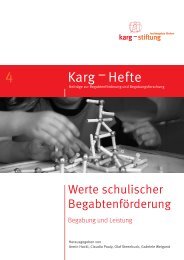FAQS: Frequently asked questions about giftedness
The Karg Foundation receives a lot of questions on the subject of giftedness—FAQs (Frequently Asked Questions)—far more often indeed than it did ten years ago. And this is a good thing! Many people involved in the educational processes of children have come to realize that giftedness can also be a fundamental personality trait of children and adolescents. The Karg Foundation wants to answer the questions you may have not only as educational and psychological professionals in educational institutions or working as educational providers, policy makers, or in training and further education institutes, but as parents and gifted people also: What is giftedness? How can it be identified? Who can provide advise for gifted children and their families? How can they be supported in the best possible way?
The Karg Foundation receives a lot of questions on the subject of giftedness—FAQs (Frequently Asked Questions)—far more often indeed than it did ten years ago. And this is a good thing! Many people involved in the educational processes of children have come to realize that giftedness can also be a fundamental personality trait of children and adolescents.
The Karg Foundation wants to answer the questions you may have not only as educational and psychological professionals in educational institutions or working as educational providers, policy makers, or in training and further education institutes, but as parents and gifted people also: What is giftedness? How can it be identified? Who can provide advise for gifted children and their families? How can they be supported in the best possible way?
Create successful ePaper yourself
Turn your PDF publications into a flip-book with our unique Google optimized e-Paper software.
What types of support are<br />
possible?<br />
Support can be provided in different ways and in<br />
different places. Children can receive support in the family<br />
and at the Kita, and later at school. In terms of school<br />
support, a distinction can be made between gifted children<br />
who are in the same class as other students who are not<br />
gifted (internal differentiation) and those who are in the<br />
same class as other gifted students on a permanent or<br />
part-time (e.g., on a daily or hourly) basis (external differentiation).<br />
There are also many other possible sources of<br />
support, such as clubs, institutions of higher learning, and<br />
summer academies. In addition, there are many organizations<br />
that offer students the opportunity to participate in<br />
competitions, either individually or in groups.<br />
Several principles of support can be distinguished,<br />
and these can be implemented in one form or another at<br />
each place that offers support to children and adolescents.<br />
(1) Individualization or internal differentiation: During<br />
group learning with others in the school or Kita settings,<br />
activities and challenges are adapted to the individual<br />
children to facilitate good and effective learning. Internal<br />
differentiation allows children within a class or learning<br />
group to choose tasks or learning paths that are individually<br />
adapted in terms of difficulty. Gifted children, for example,<br />
are able to work on a more challenging topic with less<br />
assistance, and they require less repetition and practice to<br />
complete it. Even in special classes or schools for the gifted,<br />
all children differ in their learning needs and therefore also<br />
benefit from receiving individual attention.<br />
(2) Acceleration (accelerated learning): Gifted children<br />
can begin working on specific topics earlier than their<br />
peers or they can complete the material in a shorter period<br />
of time, thus gaining time to work on advanced tasks or<br />
projects. In extreme cases, they may even skip a grade in<br />
school.<br />
(3) Enrichment (enriched learning): The learning<br />
content is enriched by a broader or deeper involvement<br />
with the subject matter. This can either take place in a<br />
classroom with internal differentiation or outside the<br />
classroom, for example, in family activities, after-school<br />
clubs, or extracurricular settings.<br />
For many gifted children, it is advisable to provide<br />
support based on a combination of these principles.<br />
70 71







